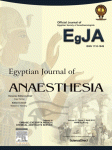 The Egyptian Journal of Anaesthesia is retracting a 2014 paper by a pair of researchers at Cairo University who appear to have tinkered with their protocol after having received ethics approval.
The Egyptian Journal of Anaesthesia is retracting a 2014 paper by a pair of researchers at Cairo University who appear to have tinkered with their protocol after having received ethics approval.
The paper, titled “Can Sugammadex improve the reversal profile of Atracurium under Sevoflurane anesthesia?” was written by Heba Ismail Ahmed Nagy and Hany Wafik Elkadi, both in the department of anesthesiology.
Sugammadex, or Bridion, is given to rapidly reverse the effects of drugs that keep patients motionless during surgery. It is available throughout the world but not, as it happens, in the United States, where the Food and Drug Administration has refused to approve the agent because of fears that it might provoke severe allergic-like reactions.
According to the retraction notice:
This article has been retracted at the request of the Publisher. Shortly after publishing the paper “Can sugammadex improve the reversal profile of atracurium under sevoflurane anesthesia?” in Egyptian Journal of Anaesthesia, http://dx.doi.org/10.1016/j.egja.2013.09.007, the journal received a request from the ethics committee of the Department of Anesthesiology, Faculty of Medicine, Cairo University, Egypt, for withdrawing the paper, claiming that they had found that the authors made changes in the protocol they had submitted to the committee. After investigating this with the authors, they affirmed that they had made some changes. For this reason, this article has been retracted.
We emailed Nagy for comment but haven’t heard back.
Like Retraction Watch? Consider supporting our growth. You can also follow us on Twitter, like us on Facebook, add us to your RSS reader, and sign up on our homepage for an email every time there’s a new post.
I’m not a fan of these types of retractions. The issue here isn’t what is in the paper but rather what the authors failed to do within their institution. I think it would have been better to punish the authors in-house and let the paper remain in the literature.
It depends what changes they made. Did they change the statistical analysis plan after data collection was complete? Did they change their endpoints during the trial? Did they put subjects at greater risk than what was described in the protocol? There are some “changes to the protocol” that can introduce unacceptable bias or make the conduct of the trial unethical. In cases like those, I think the whole paper should be wiped.